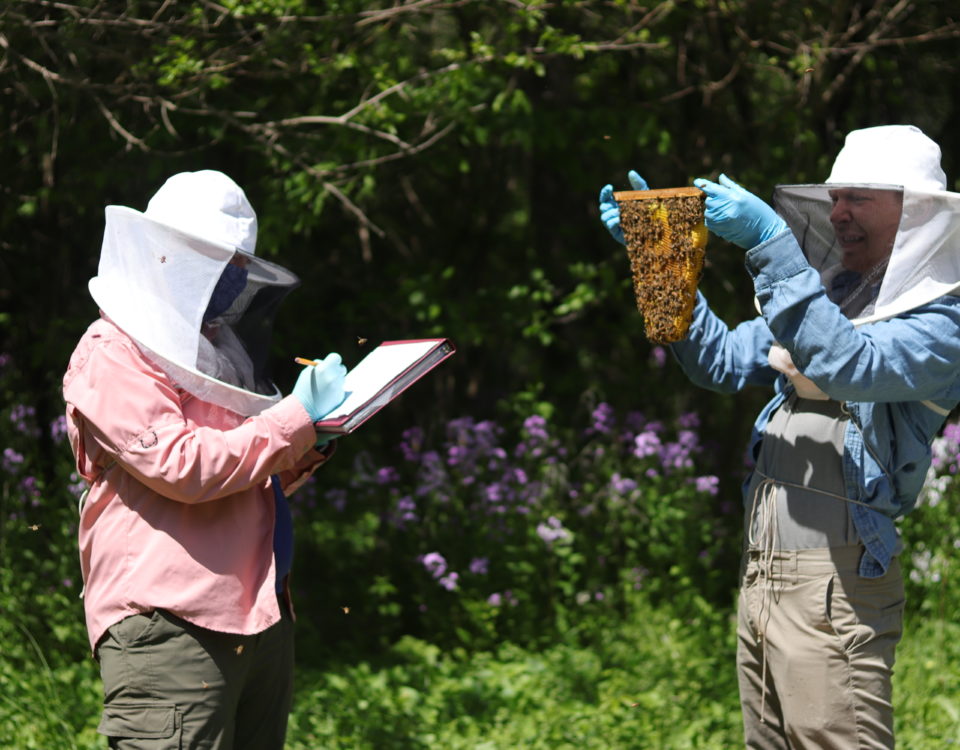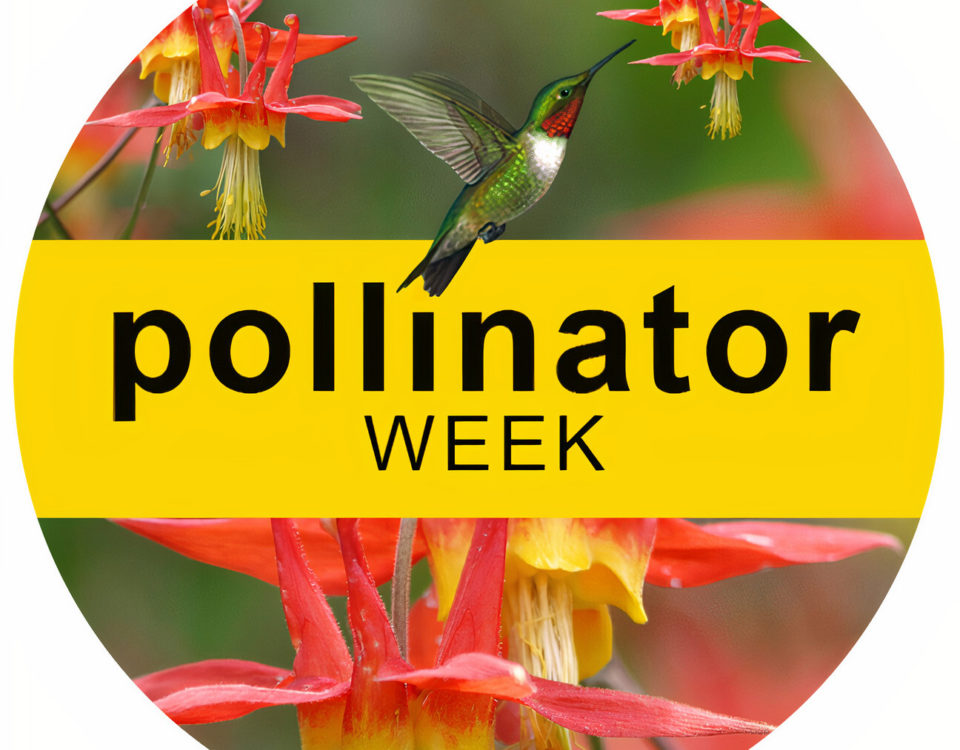- All-In-One Beekeeping for the Bees
- +1-608-728-8233
- info@beepods.com
Hops and Bees: A Lucky Combo
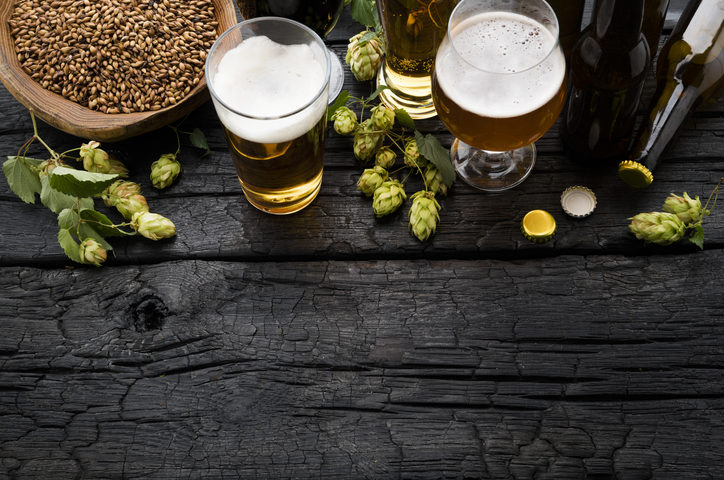
Brewing beer. It’s a process that’s been around almost as long as beekeeping. The main ingredients in beer are water, a grain (typically barley), yeast, and especially hops. When brewed and fermented together, these ingredients create the beer so many of us enjoy.
Do you know what else enjoys hops? Bees! They help pollinate hop plants. But, did you know that hops, in turn, help bees? And not in the ways you think! It turns out hops hold a secret ingredient that can help bees thrive. Keep reading to find out more!
What’s Hoppin?
Though it may not look like it, hops are actually the flower of the plant Humulus lupulus. They help add flavor and aroma to the beer, as well as help keep it fresher for longer. Without hops, beer wouldn’t even be beer. Brewers also add other ingredients like fruits, vegetables, and even honey to help flavor their beers!
If you’re near Beepods HQ in Wisconsin, then there are a few honey flavored beers that aren’t too far away! Leinenkugel’s, one of Wisconsin’s oldest breweries, brews its Honey Weiss with real Wisconsin honey. New Glarus, home of the coveted Spotted Cow, has Cabin Fever, a honey bock made with clover honey. Central Waters Brewing in Amherst, WI has a Honey Blonde Cream Ale that’s also made with real Wisconsin honey. And let’s not forget the famous Sprecher Cream Soda made with delicious honey!
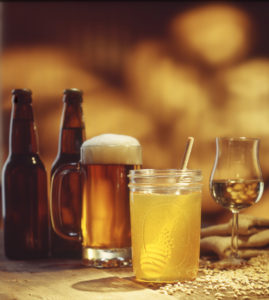
While it’s obvious that honey can add delightful flavor to beers and soda, there is also a unique connection bees have with hops that is unlike any other.
Hops to the Rescue
While bees are attracted to hops, bees aren’t exactly necessary when it comes to pollination. Hops are wind pollinated and don’t require a pollinator to land on them – though a visit from a friendly bee sure doesn’t hurt. But the real beneficiary of hops are the bees themselves, and here’s why.
You’ve heard of Varroa mites, right? Those terrible little parasites that invade your hive and wreak havoc? They’re one of the major causes of CCD, and if they aren’t dealt with right away, they’ll destroy a colony in almost no time.
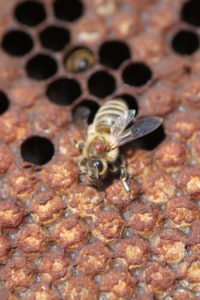 Well, it turns out that a Varroa mite’s greatest weakness might be hop beta acid or HBA. This 2012 study found that, “When varroa were placed on bees that had topical applications of 1% HBA, there was 100% mite mortality.” Even better news, HBA is non-toxic to bees! In 2015, the EPA approved the use of HBA in natural pesticides to help curb the infestations of Varroa mites.
Well, it turns out that a Varroa mite’s greatest weakness might be hop beta acid or HBA. This 2012 study found that, “When varroa were placed on bees that had topical applications of 1% HBA, there was 100% mite mortality.” Even better news, HBA is non-toxic to bees! In 2015, the EPA approved the use of HBA in natural pesticides to help curb the infestations of Varroa mites.
Final Thoughts
Bees have given us so much. Honey, wax, most of the food we eat, joy, and they’ve helped us sweeten the beer many of us will enjoy on our patios and in our backyards as the weather warms up.
At Beepods we believe in beekeeping for the bees. That means making beekeeping as natural as possible. We don’t use smokers to calm the bees or harsh chemicals to treat the colony for infestations. That is why we were so thrilled to discover that hops produce a natural mite repellent! Now that is something to raise a glass to. Cheers to hops and to the bees!
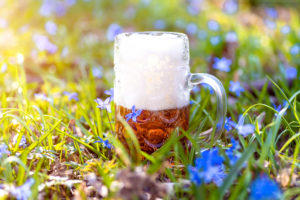
If you’re looking for other natural ways to keep your bees safe and healthy this season, sign up for a Beepods Lab membership! You’ll gain access to exclusive content, advice, and training courses that your bees will thank you for! Sign up here.
https://www.ncbi.nlm.nih.gov/pmc/articles/PMC3487002/
https://www.beepods.com/five-reasons-you-need-a-beepods-membership/
Monica Cull
Latest posts by Monica Cull (see all)
- How To Keep Your Bees Calm During An Inspection - June 30, 2021
- Pollinator Week: How COVID-19 And Modern Technology Have Impacted Bees - June 23, 2021
- Bee-Themed Activities You Can Do With Your Kids This Summer - June 17, 2021

